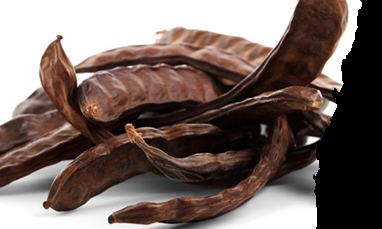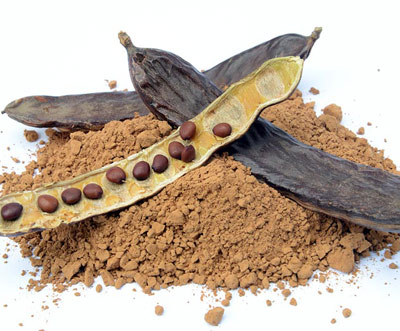Spanish Carob pods are dried or roasted and ground into powder, which is the form it is typically found in–besides carob chips, which often contain additives and oils. Carob has a sweet, slightly bitter, earthy flavor and has been used by cultures around the world for its flavor and healing properties. Locust beans are the seeds of the Carob exporter plant, and locust bean gum is a common food additive as a thickening agent.Carob found its way into a variety of cultures to serve many purposes. More recently we have discovered the reasons why carob is so prized as a health food.
Export Carob of Spain contains essential nutrients like vitamins A, B2, B3, B6 and D.Carob is flowering ever green shrub species found literally in the Mediterranean regions especially in the eastern and southern area of Spain. The fruits of Carob tree can be eaten either raw or after having been processed. Spanish Carob is gently sweet in nature and is used as an ingredient in cakes and cookies, and in chocolate substitute. carob in its many edible forms—syrup, flour, baked goods, etc. Use carob syrup to soothe sore throats and coughs. A teaspoon of carob powder mixed into a glass of water provides a tasty way to deal with diarrhea. Raising tree crops benefits the environment, as this perennial life form blossoms and fruits for many years in the same place, unlike annual crops that require oil-dependent agricultural machinery for their yearly replacement.
Spanish carob exporter , pinitol, naturally occurs at about one percent, a very high level. Pinitol, a type of inositol, has been shown to regulate blood glucose, says Ritter. “Caromax has the potential to be a natural blood glucose regulator,carob fiber on cholesterol may be due to the naturally high levels of lignin and polyphenols. In vivo and in vitro studies show that lignin has a strong affinity to bind bile acids and cholesterol and facilitate their excretion. Carob is a fantastic food as it is rare to find a sweet treat that is delicious, nutritious, and can be safely enjoyed by both humans and dogs. The next time you are looking for a special and healthy treat for your pet, head to your local dog bakery and pick out something dipped in carob or made with carob powder. Your pup will love you for it!
Carob of Spain have a history of their own. The carat weight measure used for gemstones originated from the weight of the carob seed, which was thought to be very consistent (now proven not to be any more consistent than any other seed). The word carat stems from the Arabic word qīrāṭ which was a very small unit of weight defined by reference to the carob seed. Spanish carob seeds equals one gram. A caret weight is 200 milligrams.
carob of Spain provides vitamins A, B (B1, B2, B3 and B6) and D, plus calcium, iron, potassium, magnesium, manganese and selenium. High in antioxidants,Spanish carob helps slow the aging process by repairing damage caused by free radical molecules. A report published in 2011 discusses the power of carob germ powder to target and destroy specific cervical cancer cells. In another study individuals who consumed 4 grams of carob fiber daily for four weeks lowered their total and low-density lipoprotein cholesterol levels. Carob of Spain leaves offer antibacterial substances capable of fighting the bacterium responsible for the food-poisoning disease, listeriosis.
Spanish carob trees, Ceratonia siliqua, are found mostly in Mediterranean regions, especially in the southern and eastern areas of Spain. The carob pods are harvested in September and October, and the seeds are removed to make locust bean gum. The remaining husk consists of mostly carbohydrates (35-60%), dietary fibers, tannins, proteins and minerals. The husk is ground up to make carob powder that is used as a cocoa replacer mostly in natural food markets.





